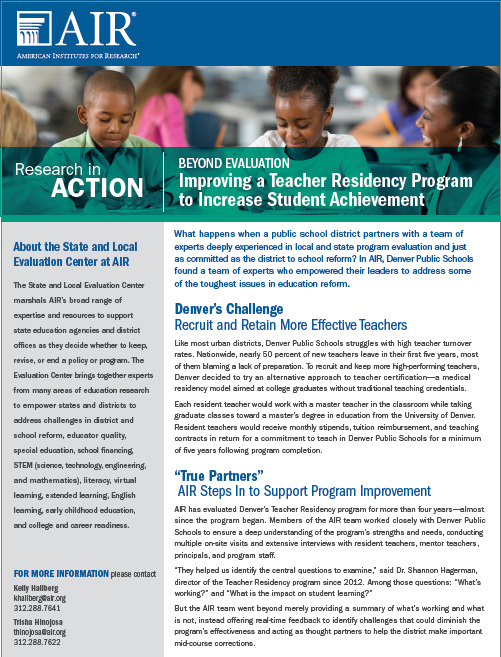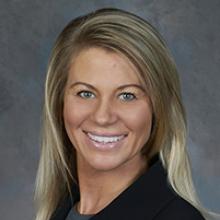Research in Action: Beyond Evaluation - Improving a Teacher Residency Program to Increase Student Achievement
What happens when a public school district partners with a team of experts deeply experienced in local and state program evaluation and just as committed as the district to school reform? In AIR, Denver Public Schools found a team of experts who empowered their leaders to address some of the toughest issues in education reform.
Denver’s Challenge
 Recruit and Retain More Effective Teachers
Recruit and Retain More Effective Teachers
Like most urban districts, Denver Public Schools struggles with high teacher turnover rates. Nationwide, nearly 50 percent of new teachers leave in their first five years, most of them blaming a lack of preparation. To recruit and keep more high-performing teachers, Denver decided to try an alternative approach to teacher certification—a medical residency model aimed at college graduates without traditional teaching credentials.
Each resident teacher would work with a master teacher in the classroom while taking graduate classes toward a master’s degree in education from the University of Denver. Resident teachers would receive monthly stipends, tuition reimbursement, and teaching contracts in return for a commitment to teach in Denver Public Schools for a minimum of five years following program completion.
“True Partners”
AIR Steps In to Support Program Improvement
AIR has evaluated Denver’s Teacher Residency program for more than four years—almost since the program began. Members of the AIR team worked closely with Denver Public Schools to ensure a deep understanding of the program’s strengths and needs, conducting multiple on-site visits and extensive interviews with resident teachers, mentor teachers, principals, and program staff.
“They helped us identify the central questions to examine,” said Dr. Shannon Hagerman, director of the Teacher Residency program since 2012. Among those questions: “What’s working?” and “What is the impact on student learning?”
But the AIR team went beyond merely providing a summary of what’s working and what is not, instead offering real-time feedback to identify challenges that could diminish the program’s effectiveness and acting as thought partners to help the district make important mid-course corrections.
One such challenge involved matching mentors to residents. The original matching process did not take personality into account and resulted in interpersonal conflicts and reassignments of mentors and teachers that distracted residents and disrupted classroom learning. AIR’s evaluators recommended a more purposeful approach to matching. The result: Resident-mentor matches are now more likely to last the duration of the program, and, overall, participants describe their matches as working well.
Program completion rates were another concern. The residency program is quite rigorous, requiring residents to perform well both in graduate courses and in their host schools. The program needed better information about which applicants were most likely to be successful, to ensure a high completion rate and protect their investment in participants.
Again, AIR stepped in with suggestions, this time using a statistical regression analysis to look at several rounds of successful resident teachers’ data, including their applications, written essays, grade point averages, and teacher tests. The results of this analysis allow the Denver Teacher Residency program to predict with greater accuracy which applicants will be successful in the program.
“[AIR] team members were helpful, honest, and could point out strengths and weaknesses,” explained Dr. Hagerman. “I like that they are thought partners. I can use the information they have and engage them in discussions about the data and analysis. I can test my thinking and make accurate assessments.”
The Results
Proof of Effectiveness Aids Program Sustainability Efforts
To date, more than 100 college graduates have completed the Denver Teacher Residency program. The AIR team has not only assisted the program in identifying areas where the training provided to teachers could be improved, they also tracked how well these teachers performed when they left the program and began teaching in classrooms of their own.
AIR’s evaluation showed that principal and peer observers both rate the quality of instruction by program alumni more highly than that of other new teachers. Most significantly, students of the Denver Teacher Residency graduates scored higher on the state math test than students of other new teachers in Denver Public Schools, controlling for students’ past performance.
As the district begins to seek resources to support the residency when the TQP grant ends in 2015, evidence of program’s impact is vital. AIR experts continue to provide support year-round and in any way needed, including assisting the residency program with grant applications.
When asked whether the Denver Teacher Residency program had changed because of AIR’s work, Dr. Hagerman replied, “Absolutely… They are so easy to work with and so driven to help us make the right decisions. I feel so strongly about the model they use and the quality of their people.”
“They are an external evaluator, but they have elevated their work to become true partners.”
